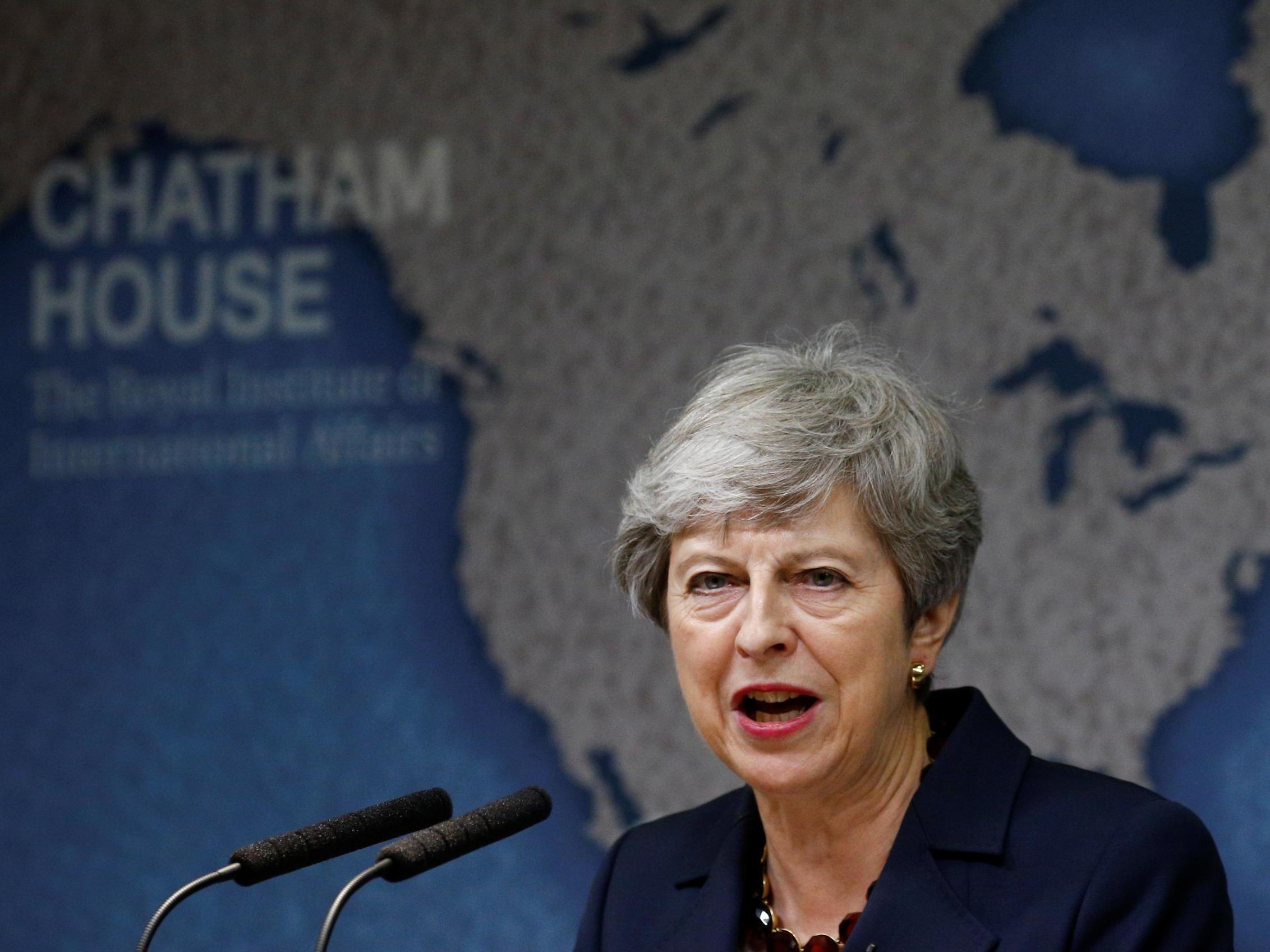In her final speech, Theresa May inadvertently cemented her legacy by reminding us of her failures
Editorial: To her credit, she admitted that she had some regrets about the words she has used, but it is a little late now

With her recent unbuttoned, witty reinvention of herself there was much hope that Theresa May, formerly “the Maybot”, would use her final major speech to tell a few home truths, settle a few scores and issue a few warnings about the direction the nation she has led for the past three years is going.
Some observers even supposed that this most cautious of politicians would let rip.
In the end, as so often in the past, she disappointed. It was more apologia than anything. Boiled down it amounted to a plea in mitigation of her own political failures. The line is – and it will be her line for evermore – that she could have delivered Brexit if other people (Labour, the Liberal Democrats, the European Research Group, the Europeans) were as reasonable as she was and as prepared to compromise. They weren’t. So her deal – “a good deal” – fell through. She didn’t quite stamp her foot and declare “it’s not my fault”, but it’s an accurate summary of the May alibi.
She was back to her usual pedestrian style of oratory. Worse than that, it was unconvincing.
The views she expressed are commonplace enough. It is perfectly true that, locally and globally, compromise is a political art form that is out of fashion. She created a bit of a golden age of sweet reason and temperate language in politics that never was. Her account of Conservative cooperation in creating the National Health Service after 1945 is a bit far-fetched. It was, after all, Nye Bevan who described her party as “lower than vermin” in that era.
Still, she had a bit of a point. Some Eurosceptics seem unwilling to compromise with themselves. “Absolutism”, as she terms it, is “a thing” nowadays. So is populism. So is extremism on the left and the right.
Without having to name names, we knew who she was moaning about when she talked about those who treat the rules-based international system as a zero-sum exercise, “the opposite of politics at its best”. We could sense the orange-tinged spectral figure of Donald Trump in the airless room of Chatham House as Ms May expostulated about polarised politics. The only figure she felt confident enough to deride specifically was Vladimir Putin. She rebuked him for his statement, on the eve of the recent G20 summit, that the liberal ideal is “obsolete”, mocking the pretensions of the Russians, whose living standards remain way behind those of the supposedly decadent and weak western European economies.
But there was another ghost in the room as the prime minister preached the gospel of cooperation: that of the May premiership. For, as a few journalists pointed out in the questions afterwards, she herself has been one of the outstandingly partisan and belligerent political personalities of the last decade. The long track record sits uneasily with the apparition of a kinder, gentler Theresa May we are now invited to believe in.
To take a few examples, then. As home secretary in the Cameron-Clegg coalition government she treated most of her Liberal Democrat junior ministers with ill-disguised contempt. Her special advisers, Fiona Hill and Nick Timothy, battled with Michael Gove’s Education Department in a vicious turf war. She was who ordered a “hostile environment” for illegal immigrants, and those vans telling them to go home. She and she alone in the government believed that immigration could be reduced to the tens of thousands, and vetoed any softening of the policy. Theresa May was unwilling to even compromise with reality.
As prime minister, she also continued to use some strong and unsuitable language: “queue jumpers” for EU citizens living and working in the UK (for which she apologised once again); and “citizens of nowhere” about the pro-Europeans. She was hardly above peddling a few tabloid-style myths of her own when she attacked the Human Rights Act: “We all know the stories about the Human Rights Act. The violent drug dealer who cannot be sent home because his daughter – for whom he pays no maintenance – lives here.
“The robber who cannot be removed because he has a girlfriend. The illegal immigrant who cannot be deported because – and I am not making this up – he had a pet cat.”
To her credit, she admitted that she had some regrets about the words she has used, but it is a little late now.
Yet she made no apology for the most calamitous catchphrase of all: “no deal is better than a bad deal”. In yesterday’s speech, she defiantly said that she still believed it. Presumably she also still holds to the “red lines” she laid down in 2016 for the Brexit negotiations, lines that made a final agreement that much harder to achieve.
Perhaps, as she has hinted in her round of end-of-an-era interviews, Labour was never going to be sincere and cross-party talks were doomed, but the fact remains that she only made the attempt after she had lost her majority and just about lost her job.
“Words have consequences,” said Ms May, again something that might well have been aimed at Boris Johnson and Donald Trump, among others. And yet this is the figure who saw fit to make Mr Johnson foreign secretary, and to hold hands with Donald Trump and invite him over for a state visit.
Her own words and deeds had consequences too, and she has no one to blame for her failures of leadership but herself. For it is she who was so famously stubborn and resistant to compromise for so long.
“A bloody difficult woman” in the end created an inhospitably hostile political environment for herself.
Join our commenting forum
Join thought-provoking conversations, follow other Independent readers and see their replies
Comments